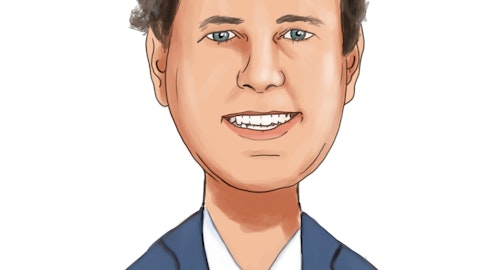Tim Carter: Yes, Steve, I can take that. I think the 72, and that includes – that would include reimbursed deal expenses, we tend to talk about it excluding that. And I think sort of at the 62 level, excluding in the fourth quarter, is what we think that looks like from a go-forward perspective. The reimburse deal is a little bit more variable based on levels of activity, particularly capital markets. But at a high level, Chad just talked about if capital markets sort of stays at the levels we saw in Q3, Q4, I think that all in, 72 going forward is sort of the right level.
Steven Chubak: Got it. Very helpful. And we touch on trends covering like all the different categories of your investment banking business and the trading or the brokerage business. As you guys went through the budgeting process for this year, I think based on the trends that we’ve seen so far, ECM better, the brokerage commentary overall positive, advisory outlook still challenged. Is your expectation that you could actually grow revenues in €˜23 relative to €˜22? Just providing a more holistic picture would be really helpful.
Chad Abraham: Yes. I mean, obviously, we don’t give annual guidance, but what I would say generally is, I think your trends are correct there. We certainly think if the first half of this year is better for ECM, and we have more quarters like Q3 and Q4, which we don’t think by any means is robust ECM, that financing certainly could be better. I think the brokerage businesses are going to depend on the market. And obviously, the wild card is advisory. I think in our commentary, we certainly think the first half can still be slow and challenged here. And so, to grow revenues for the entire year is going to be based on what sort of outlook you have for advisory in the second half. And that’s going to depend on the market conditions.
Steven Chubak: Right. And it might be helpful since like the strategic piece is a big contributor to strength, this past year, I know historically you guys have benefited from having really strong sponsor relationships. Just what you’re hearing from your sponsor clients, what they need to see in terms of clarity around the macro to make them more willing or inclined to transact here.
Chad Abraham: Yes. I mean, I think we’re really fighting two things. First, it takes a while. I always try to get – people try to pin you down on how many quarters does it take for buy or seller sort of price expectations to come in line. I would say, the conversations I’m part of, that’s much more realistic now. We’re very – we’re closer there. So, I think that will help transactions. And then it’s just financings. Can people get financings done? And certainly, the larger ones, that’s still difficult. Obviously, where it’s middle market credit funds, those deals are getting done. It might be a little less leverage, which impacts price. But all of that, we expect will slowly change. How that changes throughout the year, will impact how much the back half picks up in advisory.
Steven Chubak: That’s great color, Chad. Thanks so much for taking my questions.
Operator: . We’ll now go to Mike Grondahl with Northland Securities.
Mike Grondahl: Hey, thanks, guys. Hey, I noticed on the first page in the press release, you mentioned scaled and diversified roughly three times. And I think historically, we know about healthcare, financial services, and energy more recently, but dating to the Simmons acquisition, what other verticals do you really want to highlight with that statement, Chad? Consumer, industrials, you talked about seven verticals now. Can you just kind of emphasize what you really want us to emphasize, or acknowledge what’s sort of scaled and diversified?

